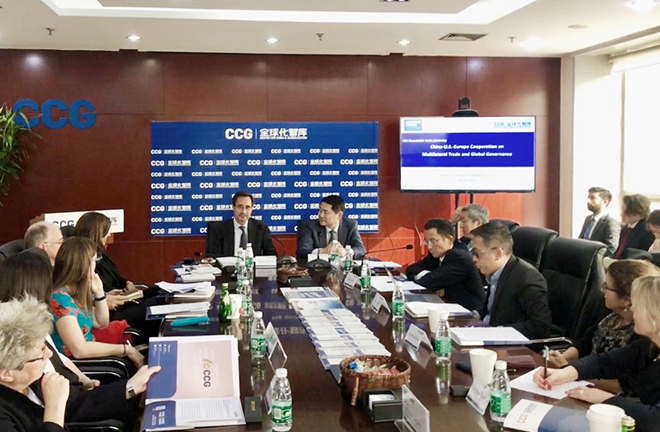Think tanks shed light on China-US-Europe cooperation

The CCG hosted a round-table conference in Beijing on Oct. 23 to discuss issues of global governance. Photo: Wang Xiaozhen/CSST
As the United Kingdom inches toward closing the Brexit deal, the heightened tensions over Brexit have combined with the 2020 US presidential election to create new anxieties about the future of the international order. In addition, China and the United States, the world’s two largest economies, are currently locked in a trade dispute.
In this context, the Center for China and Globalization (CCG) hosted a round-table conference in Beijing on Oct. 23, featuring a group of experts from the British think tank Chatham House and representatives of many other institutions to discuss how China can work with the UK and Europe to revive the global trading system, multilateral institutions and other issues of global governance.
Robin Niblett, director of Chatham House, addressed in his opening speech that it’s ironic that the US and the UK, the two Anglo-Saxon powers who have defined globalization, are now leading a retreat from this process. While the US has decided to go “America first,” the UK has chosen to “take back control.” However, despite similarities, he noted that the two countries are also very different. The US is uniquely self-sufficient, while the UK is like most other European states and many states in the world, hugely dependent on international exchanges and global systems, which are also what China stands behind. So the UK and its European neighbors are facing a dilemma, as they are allies of the US (especially on security), who seems to be pulling away from China.
Niblett said there are at least three areas where the Europeans could test whether cooperating with China could benefit world stability. The first area is helping the growth of the less developed economies around the world, such as in Africa, Central Asia and South Asia. He pointed out that the question is whether China’s development model of infrastructure investment and of engagement with the political systems in these countries will enable their sustainable development. The second is climate change, an area where obviously the Chinese and Europeans have set themselves up as two leading forces. China is promoting more climate-friendly energy policies, not only in China but beyond China as well. This is also one of the policy priorities in Europe. The third area is high technology, including 5G. Niblett believed that European countries will try to find a middle way, instead of opting for complete rejection as the Trump administration has done.
Niblett also highlighted that these cooperations can hardly move forward in a constructive way without the support of institutions, as now the globalization process is mostly about global governance, and global governance is about institutions.
Leslie Vinjamuri, head of the US and Americas Programme and dean of the Academy for Leadership in International Affairs, Chatham House, said that the ongoing trade conflict between China and the US will continue to influence regional and multilateral economic cooperation. However, beyond the official channels, she noted that it’s also necessary to note that there is a much wider discussion in the US beyond Washington, such as in universities and thinks tanks around the country.
Bonnie Glaser, a senior advisor and director of China Power Project at the Center for Strategic and International Studies, mentioned that as China wants to lead new forms of global governance, cyber governance is a good area to look at. China could set an example for the world through making improvements in domestic cyber governance.
Alexander Neill, the Shangri-La Dialogue Senior Fellow at the International Institute for Strategic Studies expected that Beijing could do better in explaining how the concept of a community of shared future for mankind applies beyond China’s borders, and what this means for the rest of the world.
Niblett said that now it’s a moment of uncertainty, insensibility and geopolitical competition. Only think tanks can bridge geopolitical competition and foster interdependence. Also, though it is now a so-called post-truth era, people still want truth and are desperate for objective information. Think tanks can be some of the best places for independent thinking and objective movements.
edited by WANG XIAOZHEN
